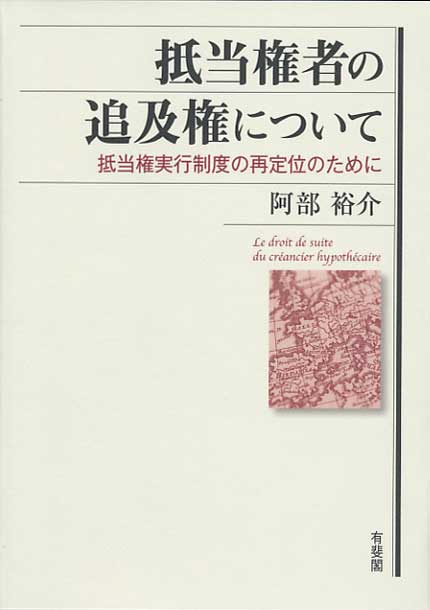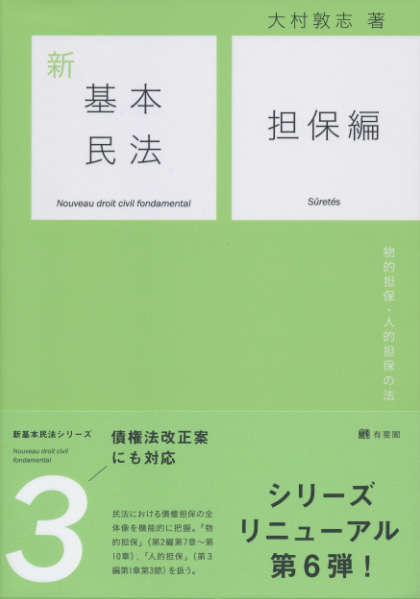
Title
Teitokensha no tsuikyuken ni tsuite (Regarding mortgagees’ droit de suite - Repositioning the mortgage enforcement system)
Size
566 pages, A5 format, hardcover
Language
Japanese
Released
August, 2018
ISBN
978-4-641-13788-2
Published by
Yuhikaku Publishing
Book Info
See Book Availability at Library
Japanese Page
After a debtor or a third-party takes out a mortgage on real estate and the mortgage is registered for the debt, creditors can receive priority payments for their claims if the real estate (the mortgaged property) is converted into cash through, for example, compulsory execution. The cash will be distributed in order of registration. Even if the person who has taken out the mortgage subsequently transfers the ownership of the property to someone else (a third-party acquirer), the creditors (mortgagees) can still receive priority payments from the cash generated from the sale of the real estate. This right is sometimes called mortgagees’ droit de suite.
Why is it that droit de suite is granted to mortgagees?
This question has virtually disappeared in current studies of Japanese law. For this reason, the very concept of droit de suite itself faces extinction. This is because the right of mortgage is regarded as a “real right,” a right attached to an object, rather than to a person. The idea is that once a real right to property is registered, this right can be claimed (asserted) against anyone and that mortgagees’ droit de suite is merely one manifestation of this right. To be more precise, a conversion of the mortgaged property into cash by the mortgagee (an auction of collateralized real estate) is regarded as the most potent feature of the right of mortgage, i.e., mortgage enforcement. Thus, the droit de suite granted to mortgagees is regarded as a means whereby they convert the mortgaged real estate into cash even though the third party acquired the real estate. Mortgage enforcement is regarded as the most potent feature of the right of mortgage because of the systemization of real rights centered on ownership rights by Japanese legal scholars. In other words, it is believed that ownership is the complete form of real rights. Just as owners control the object of their ownership, those who hold other forms of real rights also control their object in some fashion (in a less complete form). Therefore, according to this view, mortgage enforcement is an expression of the mortgagee’s control of the mortgaged property with respect to the right of mortgage.
However, based on the system of real rights, this explanation is only a figure of speech and does not accurately describe the concept of mortgagees’ droit de suite. In practice, the power that the right of mortgage exerts on those who have taken out a mortgage is not identical with the power (droit de suite) it exerts on a third-party acquirer under Japan’s Civil Code. It may appear that those who have taken out a mortgage are in the same position as third-party acquirers in that they both own the property in question. For this reason, it may appear as though third-party acquirers would also be subject to mortgage enforcement. However, third-party acquirers have a recourse; they are the only ones who are allowed to request that mortgages be extinguished by offering mortgagees the price of acquisition or another amount. There is also a system in which third-party acquirers can extinguish a mortgage by paying the price of acquisition required by the mortgagees. These features reflect that third-party acquirers are treated in a unique way under Japan’s Civil Code. Even if a certain mortgagee does not resort to mortgage enforcement, other mortgagees can put the property up for auction; creditors who are not mortgagees can also seek compulsory execution. If that happens, mortgagees will effectively have to allow their mortgages to extinguish, by receiving payments in order of registration (mortgage extinguishment). Thus, the buyer will acquire the property without the original mortgage. In order to understand such mechanisms, one must ask why mortgagees are granted the droit de suite to begin with.
This book traces the history of various mechanisms that characterize mortgagees’ droit de suite, particularly the history of the studies of French law, to identify the raison d’être of mortgagees’ droit de suite in relation to the rights to receive preferential payments. The book prompts the reader to reconsider the conventional view that mortgage enforcement is the most potent feature of the right of mortgage, as well as the system of real rights that lies behind this thinking.
(Written by ABE Yusuke, Associate Professor, Graduate Schools for Law and Politics / 2019)



 Find a book
Find a book


 eBook
eBook